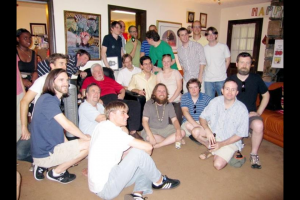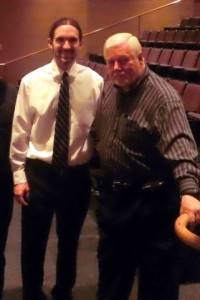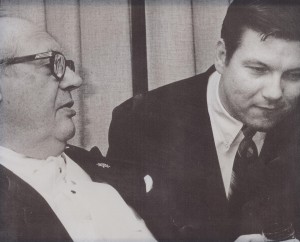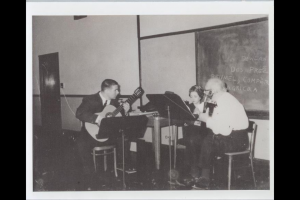It is with sadness that I announce to you the passing of a key figure in my and many other’s lives. Renowned guitar pedagogue, John Sutherland died this past Saturday (Oct. 4, 2014). I knew him for the last five years of his life, and under his tutelage, I received my Bachelor of Music Performance from the University of Georgia. There were many before me who sat in front of John Sutherland and tried with great effort to absorb all they could from his teachings. Students of John (as he would have you call him) are scattered all over the place. In fact, all of my other teachers, at one time, studied with John themselves. So with that, there are many who were lucky enough to know him for much longer than I did; but I would like to share what I can in this post, in honor of a man that helped shape my sound and my character and pushed me to see and hear the world with a wider pallet of color.
To call him a “guitar teacher” seems limiting; what he was to his students seemed to go beyond such a title. Yes, John taught many guitarists throughout his teaching career, which lasted nearly until the very end of his life. (I was even grateful to receive some of his wisdom and coaching only a couple of months before his passing.) But what he gave his students was more than lessons on how to better play the guitar. To me, he was like a life coach, helping me find myself as much as he was helping me find the music. He would say, “You have to fix yourself before you fix the guitar.” Often his life lessons were disguised, cloaked in stories and memories that would, at the very least, entertain; and, at least in my case, I sometimes wouldn’t even realize how significant or relevant our conversation was until I had some time to process the lesson and appreciate it in its entirety.
I remember the first phone call I had with John… I was nervous, aware of his legacy and lacking some self-confidence. He was kind and spoke with me for a good while, answering all of the questions I had about the guitar program at UGA. I remember one simple question he asked me that stumped me – “well, are you any good?” I had no clue how to respond, but it was so direct and yet still kind in the way he asked, it somehow made me want to study with him more. I didn’t really know if I was good, but I knew I wanted to be, and I felt like I could be.
Over the years that I studied with John, my passion for the instrument grew. On a personal note, I debated for some time between studying classical or commercial guitar. I still regularly perform with an electric or steel-string but I am so glad I went the collegiate route that I did. Even if I chose not to become a concert guitarist, I learned more about music and expression through John’s teaching than I can imagine learning in any other setting. His ear for phrasing, articulation, and quality of sound, were all magnificent. I wanted more and more to hear music the way that he did, and in my attempt, he made me pay attention to even the tiniest details of sound where beauty hides. My weekly goal became playing something in lesson that he would enjoy and perhaps be left with little to say about it, and then I would feel like an accomplished musician. Later it seemed like my theory was wrong, and that playing well actually fueled even more interesting conversation.
As kind as he was, John was never afraid to speak his mind and would certainly alert you to whether or not he liked what you were doing. This wasn’t done in an angry, overbearing way, but frequently in a funny one. Yet, even with his humor, the comment would never be taken lightly. He had so many sayings and quotes that helped bring home his points that, in certain circles, they became known as “Johnisms”. I hope someday that someone writes a book with all of the Johnisms; it could double as a humorous method book.
For the years I knew John, he struggled with advancing stages of Parkinson’s that made him certainly less mobile that he wanted to be. But right after his retirement from UGA, he had a celebration at his house, where I learned a few more stories about how “bad-ass” John was. He was an avid sportsman and mentioned to me that he played a mean hand of racquetball. He was also a policeman for some time in Washington D.C., which was a surprise to me, never suspecting such a diverse (and dangerous) occupational history. In reflection, it isn’t surprising, as it was just another way John found to help others, as he did so powerfully through music some years later. The stories we all shared that day were priceless, and they are all surfacing again through all of his students and his family.
For those less familiar with Professor Sutherland’s resume, he has contributed a great deal to the development of the classical guitar. He once told me it was difficult trying to find a teacher when he first showed interest in learning the style, though through his persistence, he found his way studying with such prestigious names as Andres Segovia, Christopher Parkening, David Arnold, John Marlow, Evanelos Assimakopoulos, and Jose Thomas. Many know him for his long career teaching at the University of Georgia, where he began the program in 1971 and retired in 2012, but at one time or another he also taught and started many of the programs at the following schools: Columbus College, Georgia State University, Agnes Scott College, Georgia Perimeter College and North Campus, Atlanta College, Atlanta Baptist College, Young Harris College, Emmanuel College, and Mercer University. He has several publications, has adjudicated many competitions, given countless masterclasses, and consulted and produced multiple recordings. For decades, his students have been winning competitions, and many have gone on to be teachers and professors themselves at colleges all over the country. In Andres Segovia’s last masterclass, three of the twelve selected performers were John’s students.
But maybe even more impressive than his great list of achievements, are those that are not so easily defined – taking my amusement with the classical guitar and turning it into passion, and perhaps doing the same with countless others; gifting the world with wonderful performers and teachers that stem from his tutelage; and giving so much of himself to his students.

The last I saw John was a few months ago. I called and spoke with him about coming to visit and he was more than happy to see me. “Bring your guitar”, he said. I arrived a few days later with a plate of cookies which he, I, and his wonderful wife B.J. made a nice dent in. I think I was there for at least 5 hours, talking and catching up on everything and anything. The topics of love and heartbreak surfaced quickly as he asked me about new developments in a situation I shared with him prior to this day. And as I poured my heart out to him, relieving my built up emotions from all that had recently occurred in my life, he listened patiently, smiled, and with a couple more beers, shared some of his experiences with me, offering at the end, a glimpse of what he learned through those tales of triumph and heartache. I will always remember him saying, “If we didn’t go through those moments, how could we ever play the Chaconne?” – a beautiful quote that will forever be with me in my time of heartache. John was much older than I am, and yet we shared so much that day, and I could tell how much he really cared for me. He granted me all of this time and attention even when his health was continually failing him, and I am only one of so many. I love John for what he taught me in the short time I knew him, but I also love him for his friendship. John Sutherland will live on through his family and all of his many students with which he shared so much and for whom he gave so much.


